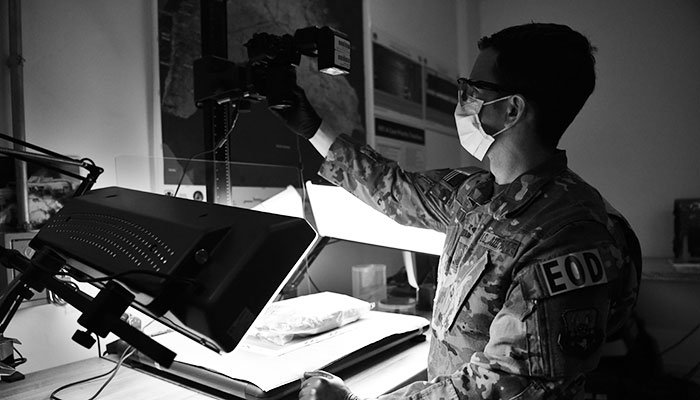From particle separators to a ballistics lab, the Central Command Forensic Exploitation Laboratory (FXL-C), located at Camp Arifjan, Kuwait seems to have everything a team would need to crack the case, solve the crime and ride off into the sunset.
However, according to Master Sgt. Michael Breive, Forensic Exploitation Laboratory – CENTCOM non-commissioned officer in charge, television shows are not even close to capturing the uniqueness of their mission, the team dynamic, or how much work there is to accomplish.
Breive, who serves as an Explosive Ordnance Disposal (EOD) technician from the 99th Civil Engineer Squadron at Nellis Air Force Base, Nevada, said this deployment is a much welcomed change of pace. Instead of suiting up and disarming improvised explosive devices, he is lending his near-decade of experience to FXL-C by overseeing the activities of the forensics laboratory.
“As an EOD Airman, we are usually the ones out there in the field,” he said. “We don’t usually get a chance to see the ‘behind-the-scenes’ action that happens after we collect a sample, or finish our job.”
According to U.S. Army Maj. Allen Spence, FXL-C officer in charge, Breive’s role isn’t just important – it is paramount for his office’s success. He said Breive is directly responsible for the safety of the lab itself and all of the personnel, allowing his team to direct all focus on processing evidence for forensics and intel.
“Master Sgt. Breive is responsible for conducting forensic exploitation of all captured enemy material throughout the CENTCOM area of responsibility,” Spence said. “In this office, the NCOIC role is critical.”
Spence said the results his team provides helps investigators across the DoD identify the contents of an explosive by detecting trace elements of materials. This helps the investigative teams identify patterns and determine if the explosives are being made by the same person or persons. He also stressed the importance of a ‘good’ sample.
“Providing a quality sample to the lab for evidence purposes can literally make or break an investigation,” Spence said. “From visiting physical blast sites, to routing the proper paperwork and coordinating the actual movement of assets, it is the NCOIC’s job to ensure a quality sample is ready for the team to review.”
“You can’t fake a DNA profile or fingerprint,” Breive said. “Our analysis provides mission partners the ammo they need to conduct their investigations and complete the mission. Working here has been eye-opening, as this team places the scientific method over opinions and speculation – allowing the truth to be discovered.”
Photos and article adapted from original by Christopher Stoltz, 386th Air Expeditionary Wing Public Affairs. Featured image: Master Sgt. Michael Breive, Forensic Exploitation Laboratory – CENTCOM NCOIC, prepares to photograph a piece of evidence June 27, 2018 at the FXL-C lab, located on Camp Arifjan, Kuwait. Breive is the sole Airman at the FXL-C office, serving in a joint expeditionary tasked and individual augmentee role.



